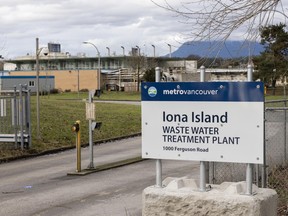The federal government’s fall economic statement confirmed the $250 million contribution, which matches a provincial one, for work Metro Vancouver hopes will bring down the replacement project’s $10 billion cost estimate.

Metro Vancouver will get $250 million in federal support for designing its $10 billion Iona wastewater treatment plant upgrade.
Recommended Videos
The commitment to a “critical infrastructure project” is among the first spending under the $6-billion Canada housing infrastructure fund created in April by then-federal Housing Minister Sean Fraser.
The commitment was announced in the recent Canadian government’s fall economic update. It matches a $250 million provincial contribution to designing the massive project.
With a $10-billion cost estimate, rebuilding Iona would be Metro’s most expensive capital project. The region is under increasing pressure to reduce the project’s cost, especially after absorbing the bombshell of a $2.83 billion cost overrun of its North Shore wastewater treatment plant.
The federal contribution is still subject to a deal being reacher by the provincial and federal governments.
The regional district’s development cost charges are due to rise substantially over three years, starting on Jan. 1. And that had been a source of friction with federal officials.
However, Metro said in a statement that the program’s application guide also says the federal ministry may consider “alternative measures” for reducing the cost of building new homes “on a case-by-case basis.”
In its statement, Metro added that its board will “know more about the conditions of this stream once the agreement is finalized by the province and federal government.”
in 2023, the federal housing minister cancelled federal deals with Burnaby and Surrey under the $4 billion Canada housing accelerator fund when Metro proposed the development charge increases.
Metro chair Mike Hurley said there was room to discuss the timing of fee increases, but in the end the regional district stuck to its principal that “growth pays for growth.”
Metro is under pressure to reduce the cost of replacing the Iona plant.
In July, the regional district awarded the project’s first major contract, worth $60.6 million for a consortium, the Fraser Delta Group, to do preliminary design work and refine the cost estimate. That include looking to rehabilitate components of the old sewage plant rather than build a wholesale replacement.
In November, Hurley led a Metro delegation, which included vice-chairman John McEwan and chief administrative officer Jerry Dobrovolny, to lobby Fraser on behalf of their application for Iona as “housing-enabling infrastructure.”
Metro needs to replace the aging Iona plant, which first opened in 1963 and no longer meets federal standards for wastewater because it only provides primary treatment.
“Funding from the federal government will be critical to keeping our services affordable for residents of the region,” Hurley said.
Expanding the Iona plant, which receives 40 per cent of Metro’s sewage, is also critical for projections for growth in the region. Iona serves a population of 750,000 now, which is expected to reach 950,000 by 2051.